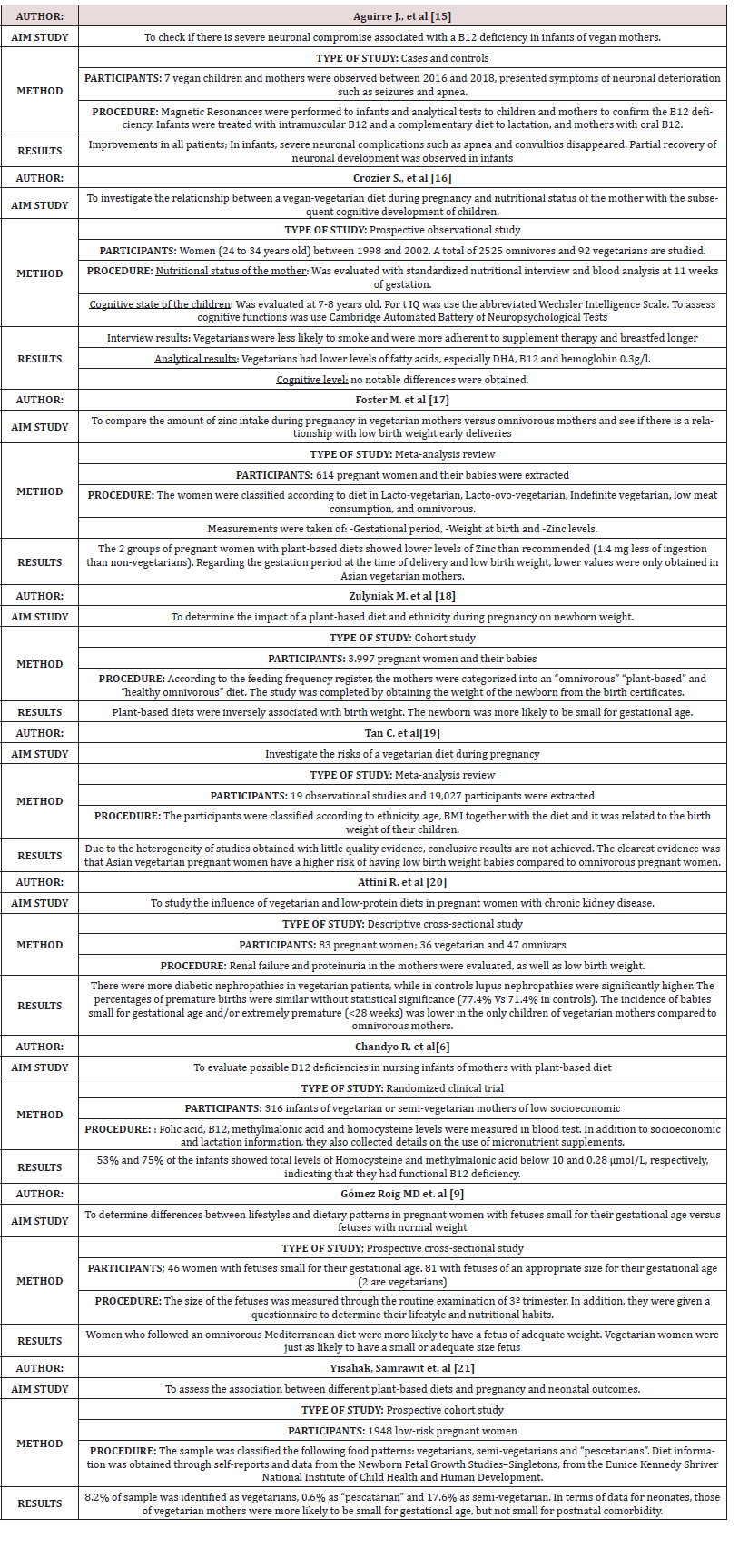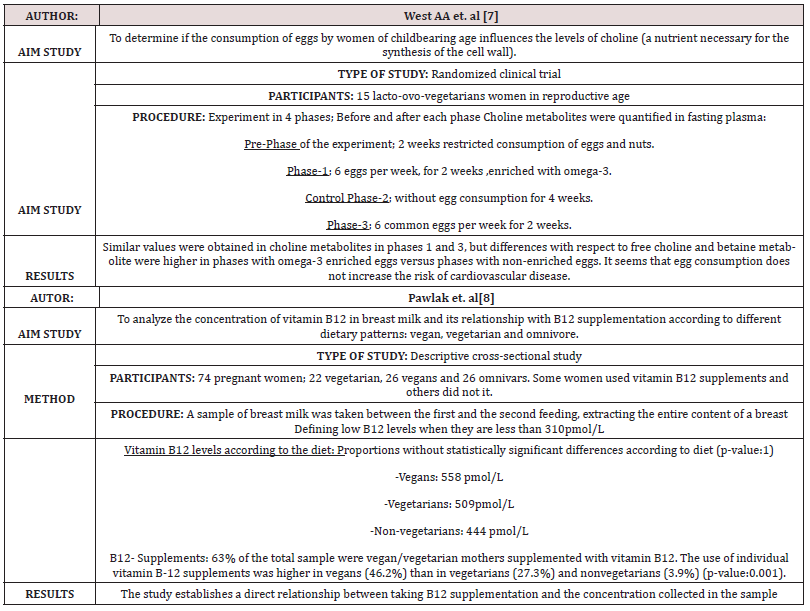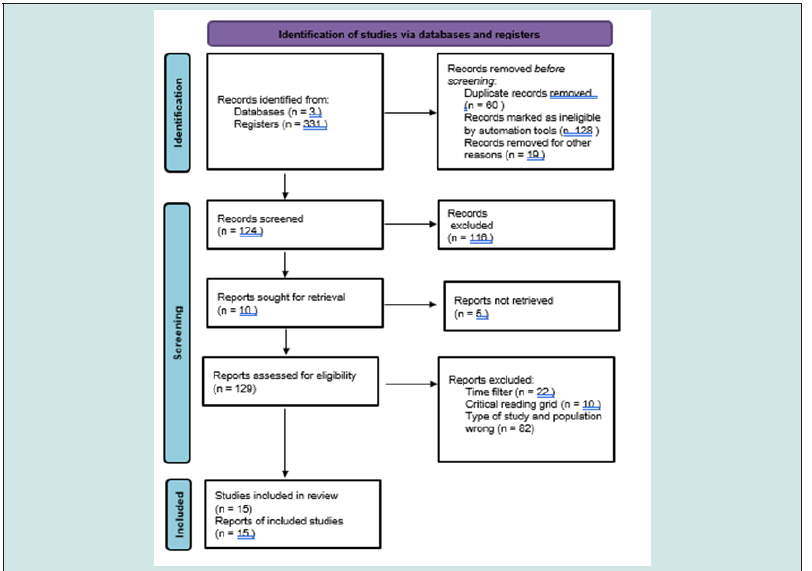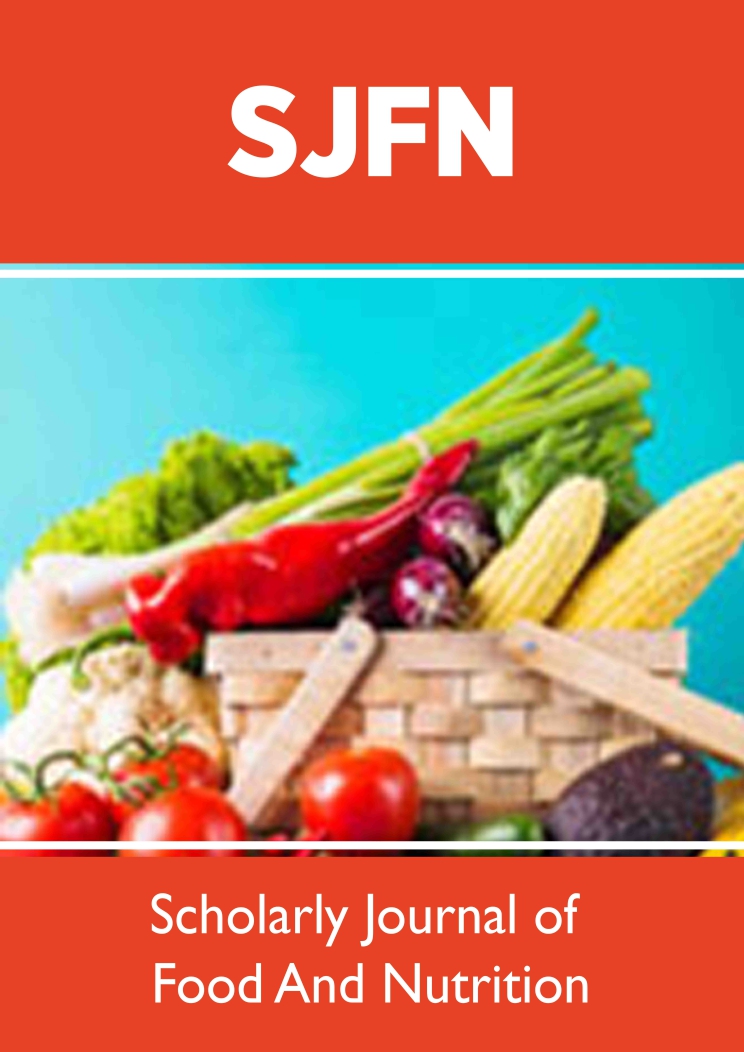
Lupine Publishers Group
Lupine Publishers
Menu
ISSN: 2638-6070
Research Article(ISSN: 2638-6070) 
Impact and Repercussion of a Plant-Based Diet During Pregnancy and Lactation
Volume 4 - Issue 5Esther Mancheno Maciá1*, Julio Molina Mula2, Marina Leal Clavel1 and Vanesa Escudero Ortiz1
- 1Pharmacy and Clinical Nutrition Group, Universidad CEU Cardenal Herrera, Spain
- 2Nursing Service, General University Hospital of Elche-FISABIO, Spain
Received:April 07, 2023; Published:April 19, 2023
*Corresponding author: Esther Mancheño Maciá, Department of Biomedical Sciences, CEU University Cardenal Herrera Plaza, Reyes Católicos, 19. 03204 Elche-Alicante, Spain
DOI: 10.32474/SJFN.2023.04.000199
Abstract
Mothers are maintaining this lifestyle during all their life stages, including motherhood. Gestation is a demanding nutritional stage, where an imbalance in certain components can lead to serious health problems for both mother and fetus. For this reason, it is necessary to pay attention to diets that restrict nutrients of animal origin. Objectives: To describe the impact and repercussion of a plant-based diet during pregnancy and lactation Methodology: Systematic review of 15 articles obtained from the following databases: Scopus, Pubmed (Medline), ScienceDirect, Cochrane Library and EBSCO using the Keywords: Plant-based diet, vegan, vegetarian, gestation, lactation, pregnant. Results: After the study of the selected research, B12 deficiencies were observed in nonsupplemented mothers and a lower birth weight in neonates of vegan/vegetarian mothers Conclusions: A plant-based diet with inadequate planning and supplementation can lead to health problems during gestation and lactation.
Abbreviations:Plant-Based Diet; Vegan; Vegetarian; Gestation; Lactation; Pregnant
Introduction
In the last decades, people who decide to maintain a plantbased diet have increased exponentially [1]; At the moment plantbased diet are widely used and are adopted for cultural, religious reasons, or motivated by the supposed benefits perceived for health or concern for animal welfare [2]. There are many definitions for the concept of a plant-based diet; Some authors consider these diets as the complete exclusion of any animal origin´s product, others authors also include those diets based on vegetables, fruits, legumes and cereals, including animal products such as milk, cheese, or occasionally meat or fish [3].
Plant-Based Diets can be Classified According to the Type of Food Allowed:
a) Semi-vegetarian diets are characterized by including
small portions and/or less frequently of animal products,
b) Pescatarian diets include seafood and dairy products,
c) Ovo-dairy-vegetarian diets include eggs and dairy
products, it is the diet that we commonly know as vegetarian,
and
d) Vegans are diets that completely exclude any product of
animal origin or derivatives [3,4].
Plant-based diets by excluding or restricting the consumption of animal products may carry a risk of causing possible nutritional deficits; This happens especially when the exact intake and optimal amounts of each food product necessary to cover the nutritional requirements of the body are not known [5-8]. For example, a vegan person will do without a large intake of protein and vitamins present in meat and fish, special attention should be paid to these deficiencies [6,7]. However, nutritional deficiencies can also occur in any other type of diet, including the omnivorous one. In addition, the nutritional needs of each person must be taken into account depending on their lifestyle and the vital moment in which they are. The normal growth and development of a fetus depends of maternal, fetal, and environmental genetic factors. Among these factors we find the diet followed by the mother of the baby, during her pregnancy and lactation [9] Inadequate nutrition during pregnancy is a global health problem. Deficiencies of certain micronutrients are associated with adverse developmental outcomes in children, including neurocognitive and immune deficits, and health status problems in general.
The consumption of plant-based diets during pregnancy or child development could produce deficits in different nutrients such as iron, zinc, vitamin D, vitamin B12, iodine, protein, and N-34 fatty acids. Folic acid deficiency is related to neural tube defects, also associated with deficits fetal growth and adverse neurodevelopmental outcomes. Thiamine stimulates the brain development of the baby and allows the conversion of carbohydrates into energy. Iodine deficits is related to congenital hypothyroidism and neurocognitive deficits. Failure of iron causes anemia and increases the risk of low birth weight, preterm birth, and perinatal (and maternal) mortality. Vitamin A participates in various functions such as vision, reproduction, immune function, growth and cell differentiation. Vitamin D allows the strengthening of bones, muscles and teeth through to the regulation of calcium and phosphate in mother and child. Zinc during pregnancy helps to slightly reduce premature births, in addition to playing an important role in cell division and brain development. Low levels of vitamin B12 (present in meat) have a negative impact on the cognitive development, motor skills and general growth of the baby [10-12].
It is necessary that the ingested doses of these micronutrients be adequate, a deficiency as well as an excess can lead to negative consequences for the mother and the child. For all these reasons, it is interesting to study the impact of plant-based diets on pregnant women or those who breastfeed their babies A competence of health professionals is to provide the necessary nutritional education to ensure the maintenance and improvement of patients´s health. Nutritional care is attended by different health professions such as: medicine, nursing and dietetics personal. But the role of each professional is not always clearly defined [13]. One of the main functions of nursing staff is health education in which nutrition has a great impact; Midwives, pediatric and obstetric nursing staff has a continuous and close contact with pregnant and lactating women [13]. Adequate nutritional education of pregnant women is associated with positive pregnancy outcomes [14]. Nursing staff are in a privileged position to provide information on healthy eating to pregnant and lactating women. A systematic bibliographic review is proposed to synthesize scientific evidence on the effects of the plant-based diet in pregnant women and lactation period; The possible risks or benefits at the physiological level in mother and child will be analyzed, as well as the effectiveness of the use of dietary supplements in plant-based diets during pregnancy and lactation. Finally, we will focus on reviewing articles that assess the knowledge that nursing staff have in relation to plant-based diets in this context.
Materials and Methods
Study Design
A systematic bibliographic review was carried out whose research question in PICO format (P: Problem or patient, I: Intervention, C: Comparison and O: Results) was: “What implication does a plant-based diet have on the health of the child and the mother during pregnancy and lactation compared to a diet that includes all kinds of nutrients with proteins from the animal kingdom”.
Search Strategy
We used the following Medical Subject Headings (MeSH): Plantbased diet, vegan, vegetarian, gestation, lactation, and pregnant combined with the booleans and/or, to search in the following databases: Pubmed/Medline, Cochrane library, and ScienceDirect.
Inclusion / Exclusión and Quality Criteria
Articles were selected according to their title and abstract, using the eligibility criteria. The inclusion criteria were: -Articles published in English or Spanish languages, and time filter: 10 years. The target population was pregnant or lactating women who maintain a vegan or vegetarian diet, fetuses and newborns of these mothers and health personnel. The CASPe (Critical Appraisal Skills Programme) critical reading grid was used as a quality criterion; Studies with a score lower than 8 out of 10 in the CASPE grid were excluded. The exclusion criteria were based on the type of study: editorial, case report, expert opinion and others reviews. Exceptionally, two systematic reviews with meta-analysis were included due to their value. After reading the articles, we carried out a secondary search with the selection of articles from the bibliography contained in the primary search respecting the inclusion criteria. Figure 1 summarizes the steps of article selection we used for our review PRISMA format.
Results
Risks or Benefits that Different Plant-Based Diets can Produce During Pregnancy and Lactation at a Physiological Level
Table 1 shows the most important results of the studies that address the question of identifying possible risks and/or benefits of plant-based diets during pregnancy and lactation. As can be seen, the increased probability of having a fetus small for gestational age or risks in the development of the fetus related to inadequate levels of vitamin B12.
Biochemical Level Alterations Produced by Plant-Based Diets During Pregnancy and Lactation
Table 2 compiles articles focused exclusively on showing biochemical findings by analyzing stool, breast milk, and blood samples. In addition, the articles described previusly and published by Chandoy R et al., Yisahak S et al, Crozier S et al., and Foster M et al., also provide some results on biochemical alterations (Table 1).
Table 1: Risks or benefits that different plant-based diets can produce during pregnancy and lactation at a physiological level.

Effectiveness the Use of Dietary Supplements in Plant- Based Diets During Pregnancy and Lactation
Table 3 summarizes the information obtained in 2 articles, first analyzes the effectiveness of enriching eggs with omega-3 compared to non-enriched eggs. This information is especially valid for vegetarian mothers because eggs, together with dairy products and honey, are the only animal´s origin products that they consume. The last article discusses the dose of vitamin B12 supplementation needed for mothers on plant-based diets. Two other works described in the previous tables, provide some information on dietary supplements in this context (see Aguirre et al., in Table 1 and Avno et al., in Table 2)
Table 3: Effectiveness the use of dietary supplements in plant-based diets during pregnancy and lactation.

Knowledge that Nursing Professionals have in Relation to Plant-Based Diets during Pregnancy and Lactation
Table 4: Knowledge that nursing professionals have in relation to plant-based diets during pregnancy and lactation.

Finally, Table 4 shows the result of article that explores the knowledge possessed by healthcare personnel, and specifically nursing. Information collected through surveys carried out in hospitals in the Milan metropolitan area.
Discussion
Risks or Benefits that Different Plant-Based Diets can Produce during Pregnancy and Lactation at a Physiological Level Low weight to Gestational Age:
Most authors indicate that a vegan or vegetarian diet can negatively affect the weight of the fetus and newborn, as shown by Zulyniak et al., [18]. in their study and Yisahak S et al., [21], who found that neonates of vegetarian mothers were smaller than neonates of non-vegetarian mothers, although without relation to pathological changes in children Gómez Roig et al., [9] found the same probability that a vegetarian mother would have a child with low weight for gestational age or mother’s age compared to omnivarous mothers, although we are talking about a study with a very small sample, so caution must be exercised [9]. Foster M et al., [9] focused on analyzing zinc levels in vegetarian women but also demonstrated that women of Asian ethnicity with plantbased diets have a higher risk of preterm and low birth weight infants. In the same way, Tan C et al., [19], also demonstrates the existence of a higher probability of having low-weight children in Asian women who consume a plant-based diet compared to their omnivorous counterparts. Despite this, there is no absolute truth to the fact that Asian ethnicity is more affected by such a diet, since omnivorous Asian women were also found to have lower percentile infants compared to other ethnicities [19]. Surprisingly the work of Attini R et al., shows that mothers with planned vegetarian diets have babies with a higher birth weight than the control group, but taking into account that the mothers in the control group followed unplanned omnivorous diets [20].
Cognitive Decline
As observed in the study by Aguirre J et al., [15], a vegan or vegetarian diet that is poorly planned by the mother can cause serious problems in infants who exclusively feed on breast milk. 7 cases were reported in which there was a deficiency of vitamin B12 in the mother, which led to a deficiency of this vitamin in infants who even suffered episodes of convultions and apnea possibly caused by neuronal compromise due to this deficiency [15].
On the other hand; Crozier S. et al16 compared Cognitive test scores in 7–8-year-old children of vegetarian and vegan mothers who breastfed their children against omnivorous mothers, obtaining similar data in both groups. The two pieces of information are not contradictory, since the difference between the Crozier S et al., [16] study and Aguirre et al., [16] is that the latter points to inadequate diet planning and B12 deficiency as the cause of cognitive deterioration. Benefits of a plant-based diet versus an omnivorous diet. No results have been found that provide a beneficial outcome of plant-based diets versus an omnivorous diet [21]. It should be noted that although there is no direct benefit from plant-based diets, Crozier SR et al., [16] indicates that vegetarian mothers have a lower incidence of unhealthy habits such as smoking, drinking alcohol, consuming sugary drinks or ultra-processed foods during pregnancy and also maintain breastfeeding for more weeks than omnivorous mothers [16].
Biochemical Level Alterations produced by Plant-Based Diets during Pregnancy and Lactation
At this point we will discuss the results obtained in blood samples, stool samples or breast milk.
Blood Samples:
Regarding vitamin B12, we highlight that Aguirre J et al., [15] determined that in the study context, levels below 200pg/ml produced neuronal compromise in the children described in their cases. Compiling the data provided by the authors Auvon et al., [24], Crozier SR et al., [18] and Chandyo R et al., [6]. It can be affirmed that plant-based diets produce a vitamin B12 deficit compared to omnivorous diets. In relation to zinc levels an according to the findings of Foster M et al., [17], samples obtained from both vegetarians and non-vegetarians mothers are deficient in zinc and vegan mothers consume 1.4 mg/d less zinc than omnivorous mothers, that is 13% of the required daily amount. which is 11mg/d [22]. Yisahak S et al., [21], observed the same deficiency; an intake of 9.4mg/d in plant-based diets compared to 13.5mg/d [15] in omivaras.
Breast Milk Samples:
Perrin M et al., [23], obtained that the content of unsaturated fatty acids is higher in samples from vegetarian and vegan mothers versus in omnivorous mothers. But in contrast the DHA was lower than omnivores. It is also noteworthy that only 1/3 of the women who based their diet on plants took a DHA supplement [23].
Microbiota Samples
Barret H et al., [22], using stool showed that samples from vegan and vegetarian mothers, had greater richness and variability of intestinal flora involved in the degradation of fatty acids compared to samples from ommivaras. In addition, they established a relationship between the consumption of dietary fiber, consumed in greater quantity by vegans and vegetarians, and a decrease in Collinsella bacterium, which in turn is associated with a lower level of insulin [22].
Effectiveness the Use of Dietary Supplements in Plant- Based Diets during Pregnancy and Lactation Fortified Foods:
The results obtained by West et al7 indicated the effect of enriching eggs with omega-3 gives off positive data on the influence of choline metabolism; The author states that both normal and enriched eggs increase choline metabolism, but by enriching eggs with omega-3 we get more free choline.
Vitamin B12 Supplements:
The case-control study published by Aguirre J et., [15] details how they were able to reverse episodes of apnea and convultions through intramuscular administration of B12 vitamin. Moreover, with supplementation of vitamin B12, the levels are maintained in adequate physiological ranges in mother and child. On the other side, Pawlak R et al., [8] observed that concentration of vitamin B12 in breast milk of mothers with plant-based diets was higher than in omnivorous mothers. It should be noted 63% of vegans to vetetarians participants took vitamina B12 supplements [8]. In the same line, Avno T et al., [24], showed that there were vegetarian women who, without supplements, had lower values than participants on the same diet taking vitamin B12 supplements [24].
Knowledge that Nursing Professionals have in Relation to Plant-Based Diets during Pregnancy and Lactation
Bettinelli M et., al [4] demonstrated that nursing health personnel had knowledge gaps regarding the effects of plant-based diets; It was especially alarming that only 55.7% of the participants were aware of the risk of not supplementing with vitamin B12 and 79.9% of the participants had not received training in nutrition in the last 5 years [4]; This data is worrying because plant-based diets have had a boom in recent years. One of the main limitations of this review has been the limited number of articles that discuss this issue.
The most Relevant Conclusions of this Systematic Review are the Following.
During pregnancy or lactation, plant-based diets are no more beneficial to fetuses and infants than omnivorous diets. Vitamin B12 supplementation in women who follow plant-based diets is effective in compensating for deficiencies of this vitamin, therefore it is essential to do. It is also advisable to supplement mothers’ plant-based diets with omega-3 fatty acid DHA and Zinc. A poorly planned, plant-based diet increases the risk of a small-forgestational- age fetus. In this context, it is necessary to prepare a dietary plan by nutrition professionals to increase the probability that the fetus will have an adequate weight for its gestational age.
In the future, it would be interesting to develop research work on the knowledge that nursing health professionals have about the effects of plant-based diets.
Acknowledgements
The authors would like to thank for facilitating and subsidizing us to be able to carry out research work.
References
- National Diet and Nutrition survey: Headline results from years 1, 2 and 3 (combined) of the rolling programme.
- Burdge GC, Tan SY, Henry CJ (2017) Long-chain n-3 PUFA in vegetarian women: A metabolic perspective. J Nutr Sci 6(58): 1-8.
- Satija A, Bhupathiraju SN, Spiegelman D, Chiuve SE, Manson JE, et al. (2017) Healthful and unhealthful plant-based diets and the risk of coronary heart disease in U.S. adults. J Am Coll Cardiol 70(4): 411-22.
- Bettinelli ME, Bezze E, Morasca L, Plevani L, Sorrentino G, et al. (2019) Knowledge of health professionals regarding vegetarian diets from pregnancy to adolescence: An observational study. Nutrients 11(5): 1149-1149.
- Hu Z, Tang L, Xu HL (2018) Maternal vitamin D deficiency and the risk of small for gestational age: A meta-analysis. Iran J Public Health 47(12): 1785-95.
- Chandyo R, Ulak M, Kvestad I, Hysing M, Shrestha M, et al. (2018) Cobalamin and folate status among breastfed infants in Bhaktapur, Nepal. Nutrients 10(5): 639-639.
- West AA, Shih Y, Wang W, Oda K, Jaceldo-Siegl K, Sabaté J, et al. (2014) Egg n-3 fatty acid composition modulates biomarkers of choline metabolism in free-living lacto-ovo-vegetarian women of reproductive age. J Acad Nutr Diet 114(10): 1594-600.
- Pawlak R, Vos P, Shahab Ferdows S, Hampel D, Allen LH, et al. (2018) Perrin MT. Vitamin B-12 content in breast milk of vegan, vegetarian, and nonvegetarian lactating women in the United States. Am J Clin Nutr. 108(3): 525-531.
- Gómez Roig MD, Mazarico E, Ferrero S, Montejo R, Ibáñez L, et al. (2017) Differences in dietary and lifestyle habits between pregnant women with small fetuses and appropriate-for-gestational-age fetuses. J Obstet Gynaecol Res 43(7): 1145-1151.
- Medicine (2019) Committee on Nutritional Status During Pregnancy and Lactation. Nutrition During Pregnancy: Part I Weight Gain: Part II Nutrient Supplements. Washington, USA.
- Agriculture USD, S U. Department of Health and Human Services. Dietary Guidelines for Americans. 2010
- Baker SJ, Jacob E, Rajan KT, Swaminathan SP (1962) Vitamin-B12 deficiency in pregnancy and the puerperium. Br Med J 1(5293): 1658-1661.
- Jefferies D, Johnson M, Ravens J (2011) Nurturing and nourishing: The nurses role in nutritional care. J Clin Nurs 20(3-4): 317-330.
- Ilmonen J, Isolauri E, Laitinen K (2012) Nutrition education and counselling practices in mother and child health clinics: Study amongst nurses: Nutrition counselling in health clinics. J Clin Nurs 21(19-20): 2985-2994.
- Aguirre JA, Donato ML, Buscio M, Ceballos V, Armeno M, et al. (2019) Serious neurological compromise due to vitamin B12 deficiency in infants of vegan and vegetarian mothers. Archivos Argentinos de Pediatria 117(4): 420-424.
- Crozier SR, Godfrey KM, Calder PC, Robinson SM, Inskip HM, et al. (2019) Vegetarian diet during pregnancy is not associated with poorer cognitive performance in children at age 6–7 years. Nutrients. 11(12): 3029-3029.
- Foster M, Herulah UN, Prasad A, Petocz P, Samman S (2015) Zinc status of vegetarians during pregnancy: A systematic review of observational studies and meta-analysis of zinc intake. Nutrients 7(6): 4512-4525.
- Zulyniak MA, de Souza RJ, Shaikh M, Desai D, Lefebvre DL, et al. (2017) Does the impact of a plant-based diet during pregnancy on birth weight differ by ethnicity? A dietary pattern analysis from a prospective Canadian birth cohort alliance. BMJ Open 7(11): 017753.
- Tan C, Zhao Y, Wang S (2019) Is a vegetarian diet safe to follow during pregnancy? A systematic review and meta-analysis of observational studies. Critical Reviews in Food Science and Nutrition 59(16): 2586-2596.
- Attini R, Leone F, Parisi S, Fassio F, Capizzi I, et al. (2016) Vegan-vegetarian low-protein supplemented diets in pregnant CKD patients: fifteen years of experience. BMC Nephrol 17(1): 132-132.
- Yisahak SF, Hinkle SN, Mumford SL, Li M, Andriessen VC, et al. (2021) Vegetarian diets during pregnancy, and maternal and neonatal outcomes. Int J Epidemiol 50(1): 165-178.
- Barrett HL, Gomez-Arango LF, Wilkinson SA, McIntyre HD, Callaway LK, et al. (2018) A vegetarian diet is a major determinant of gut microbiota composition in early pregnancy. Nutrients 10(7): 890-890.
- Perrin MT, Pawlak R, Dean LL, Christis A, Friend L (2019) A cross-sectional study of fatty acids and brain-derived neurotrophic factor (BDNF) in human milk from lactating women following vegan, vegetarian, and omnivore diets. European Journal of Nutrition 58(6): 2401-2410.
- Avnon T, Anbar R, Lavie I, Ben Mayor Bashi T, Paz Dubinsky E, et al. (2020) Does vegan diet influence umbilical cord vitamin B12, folate, and ferritin levels?. Archives of Gynecology and Obstetrics 301(6): 1417-1422.

Top Editors
-

Mark E Smith
Bio chemistry
University of Texas Medical Branch, USA -

Lawrence A Presley
Department of Criminal Justice
Liberty University, USA -

Thomas W Miller
Department of Psychiatry
University of Kentucky, USA -

Gjumrakch Aliev
Department of Medicine
Gally International Biomedical Research & Consulting LLC, USA -

Christopher Bryant
Department of Urbanisation and Agricultural
Montreal university, USA -

Robert William Frare
Oral & Maxillofacial Pathology
New York University, USA -

Rudolph Modesto Navari
Gastroenterology and Hepatology
University of Alabama, UK -

Andrew Hague
Department of Medicine
Universities of Bradford, UK -

George Gregory Buttigieg
Maltese College of Obstetrics and Gynaecology, Europe -

Chen-Hsiung Yeh
Oncology
Circulogene Theranostics, England -
.png)
Emilio Bucio-Carrillo
Radiation Chemistry
National University of Mexico, USA -
.jpg)
Casey J Grenier
Analytical Chemistry
Wentworth Institute of Technology, USA -
Hany Atalah
Minimally Invasive Surgery
Mercer University school of Medicine, USA -

Abu-Hussein Muhamad
Pediatric Dentistry
University of Athens , Greece

The annual scholar awards from Lupine Publishers honor a selected number Read More...






